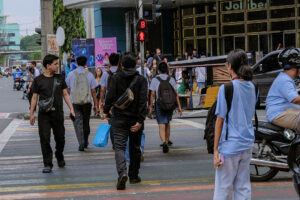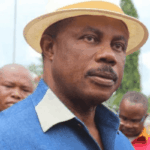
By Kenneth Christian L. basilio, reporter
More than 80% of Mega Manila residents believe that President Ferdinand R. Corruption has worsened under Marcos, Jr., a Social Weather Station (SWS) survey showed Thursday, as his government's crackdown on corruption has led to public distrust in his government.
Based on survey data presented by SWS at the roundtable discussion, about 84% of Filipinos in Metro Manila and surrounding provinces believe there is “a lot” of corruption under Mr. Marcos' government, the highest level recorded in two decades and surpassing perceptions of corruption under the previous administration.
About 14% of respondents said there is “some” corruption in the Marcos administration, while 1% said there is “a little” and about 0.1% said there is none, according to the pollster, which surveyed 600 Filipinos with a ±4 error margin from October 19 to October 22.
A previous SWS survey conducted in 2018 during the Duterte administration showed that 45% believed there was widespread corruption, while 41% said there was some corruption. Under the late President Benigno SC Aquino III, the perception of widespread corruption peaked at 63% in 2016.
The perception that corruption is omnipresent reached 77% in 2001 under former President Gloria Macapagal-Arroyo and 63% in 2000 under former President Joseph Estrada.
Corruption allegations are nothing new in the Philippines and each president has seen his administration tainted by allegations of wrongdoing, with many Filipinos believing that corrupt acts were tolerated or even sanctioned under his watch.
But the flood control controversy under Mr. Marcos's government has struck a chord with Filipinos because of the scale of alleged fraud and alleged collusion between politicians and contractors to siphon billions of pesos from infrastructure projects widely considered necessary in the flood-prone country.
“The corruption scandal has been very prominent in recent months… It has really captured the political imagination of Filipinos,” Jean S. Encinas-Franco, a political science professor at the University of the Philippines, said on stage.
Ms. Arroyo and former President Rodrigo R. “Unlike previous corruption scandals like the NBN-ZTE deal and the Pharmali scandal, this latest scandal is very visible,” he said, referring to corruption allegations that have rocked Duterte's administration.
The pollster said 77% of Filipinos believe corruption is more widespread now, while 11% said it is about the same as three years ago. About 12% said corruption was more prevalent three years ago.
While half of the respondents said they had no direct experience with government corruption, 16% reported encountering it in the past month, 12% in the past two to three months, 3% in the past four to six months, 5% in the past six to 12 months, and 13% more than a year ago.
Only 4% of those who experienced corruption said they reported it, 3% reported it to government offices, 1% reported it to private anti-corruption groups, and 0.2% reported both.
“When we asked, 'Why didn't you report this?' The initial reaction… was: 'Nothing will be done anyway.'”, SWS Vice President Gerardo A. Sandoval said while presenting the survey on stage.
anti corruption efforts
The pollster said that 27% of respondents believed that anti-corruption efforts under the Marcos administration were not effective at all, while 33% said they were hardly effective. About 19% considered them somewhat effective, and 12% said they were very effective.
Authorities have stepped up investigations into projects allegedly linked to a billion-peso kickback scheme involving politicians, state engineers and contractors, as public pressure for accountability grows.
The survey revealed that 66% of respondents view governance issues as the most serious concern in society, followed by economy (15%), social services (10%), democracy (4%), crime (2%), and infrastructure (1%).
“People are frustrated with corruption and the behavior and hypocrisy of their officials,” Victor Andres C. Manhit, president of the think tank Stratbase-ADR Institute, said at the forum. “In their demands for transparency and accountability, what is being done is not enough to even scratch the surface of the crisis.”
Respondents were divided on whether the Independent Commission for Infrastructure would conduct its hearings impartially, with 26% expressing confidence, 35% lacking confidence, and 29% undecided.
More than half of the respondents (56%) said existing laws are inadequate to deal with corruption, while 25% said they are adequate. The survey showed that about 19% were undecided.










